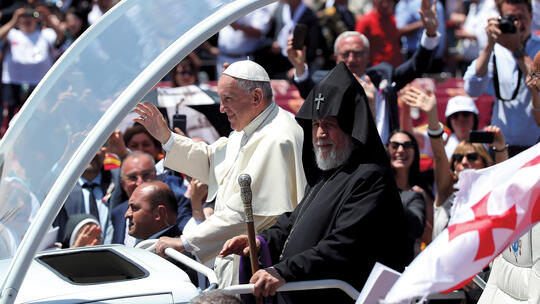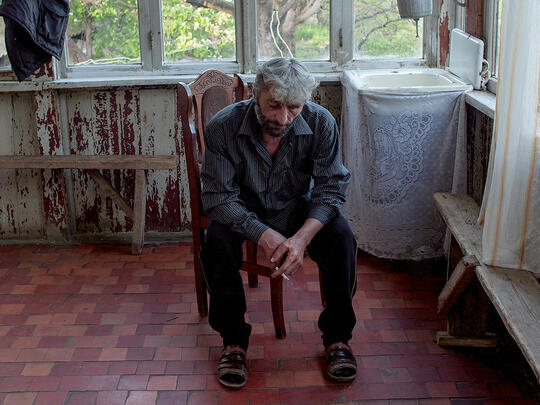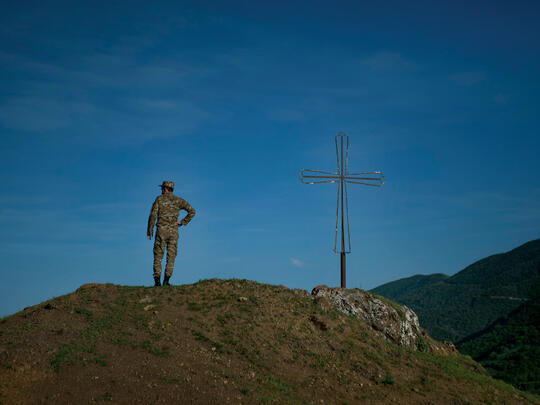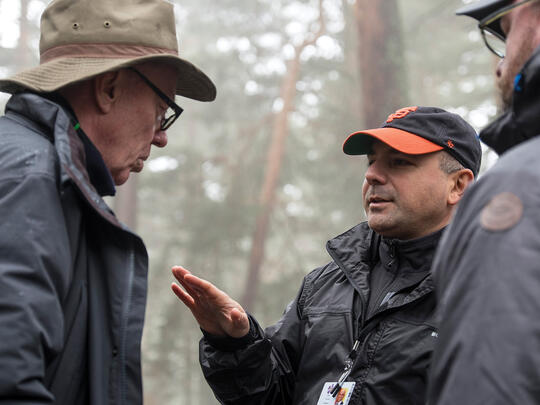In a closely watched and symbolic visit to Armenia, Pope Francis has once again affirmed his vocal support for the Armenian cause. At each stop, the Holy Father inspired crowds of people, poignantly addressing the theme of memory; that it should never be a source of shame, but a powerful motivation and vehicle for transformation toward a brighter and more peaceful future.
The three-day visit in late June was the result of a personal invitation from His Holiness Karekin II, the Supreme Patriarch of the Armenian Apostolic Church and Catholicos of All Armenians, and President Serzh Sargsyan. The papal visit garnered widespread international media coverage that focused on the Pope’s political message delivered within hours of his arrival on Armenian soil. From the Presidential Palace in Yerevan, Pope Francis urged the world to never forget or minimize the Armenian Genocide, ad-libbing the word “genocide” that was conspicuously absent from his prepared text. “Sadly that tragedy, that genocide, was the first of the deplorable series of catastrophes of the past century,” he declared, “made possible by the twisted racial, ideological, or religious aims that darken the minds of the tormentors, even to the point of planning the annihilation of entire peoples.”
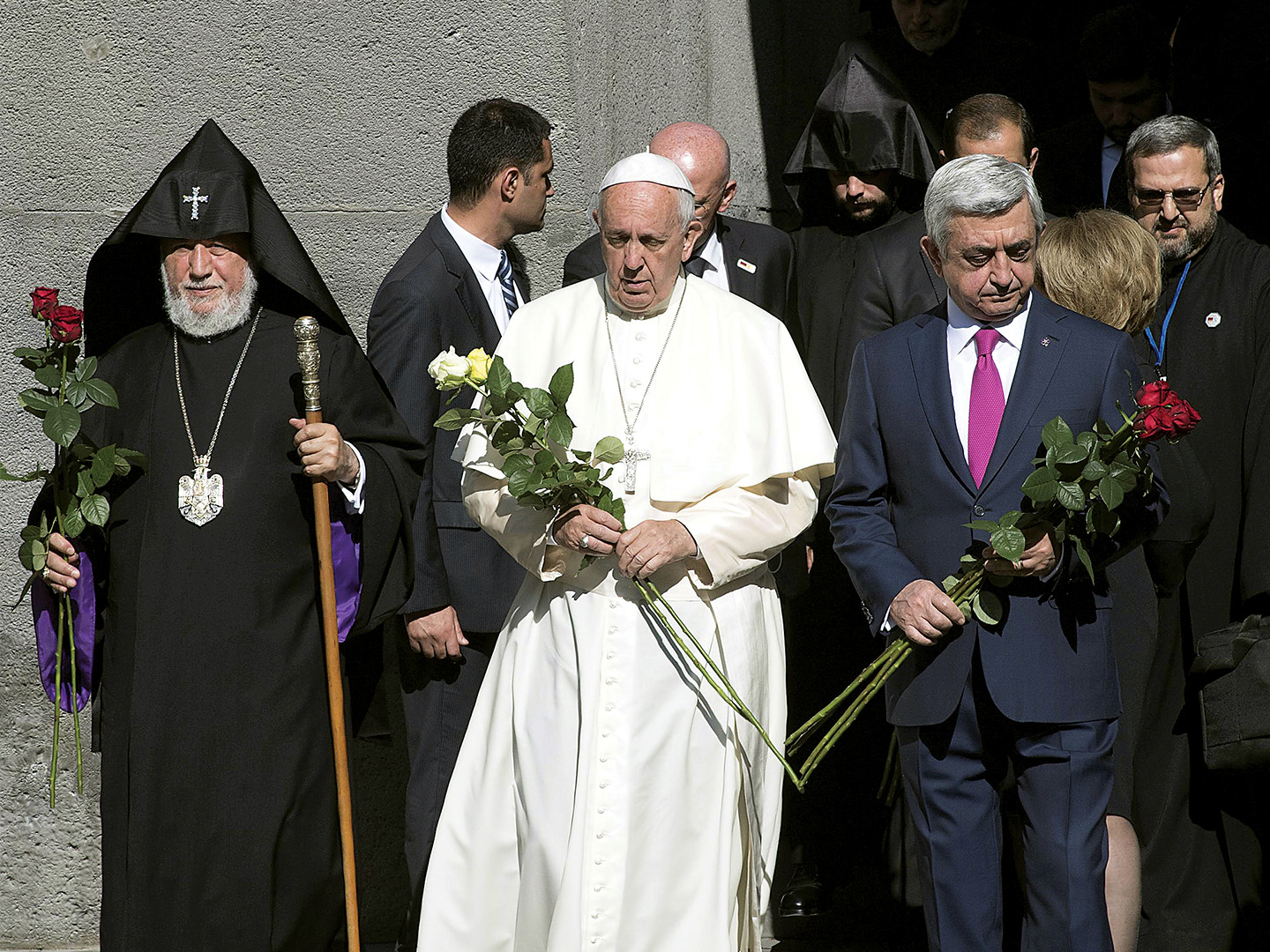
The words were met with a standing ovation from the audience of Armenian political and religious leaders, as well as members of the diplomatic corps. “One cannot but believe in the triumph of justice when in 100 years…the message of justice is being conveyed to mankind from the heart of the Catholic world,” President Serzh Sargsyan remarked afterwards.
The Pope’s symbolic visit, one year and a month after his historic Centenary commemoration address in St. Peter’s Basilica in which he first publicly referred to the slaughter of more than 1.5 million Armenians as a genocide, is a testament to the Vatican’s close ties to the Armenian Apostolic Church and cemented the Pope’s alliance with the Armenian people, dating back to the bond he developed with the diaspora community in his native Argentina.
During the tour Pope Francis paid his respects at Armenia’s Tzitzernakaberd Genocide Memorial Complex where he greeted descendants of Genocide survivors including descendants of the 400 Armenian orphans taken in by Popes Benedict XV and Pius XI at the papal summer residence south of Rome in the 1920s.
“Here I pray with sorrow in my heart, so that a tragedy like this never again occurs, so that humanity will never forget and will know how to defeat evil with good,” Pope Francis wrote in the memorial’s guest book. “May God protect the memory of the Armenian people. Memory should never be watered-down or forgotten. Memory is the source of peace and the future.”
The Pope then boarded a plane to Gyumri where in front of several thousand people in Vartanants Square, he celebrated his only public Catholic Mass of the visit. “Peoples, like individuals, have a memory,” he told the crowd from the altar. “Your own people’s memory is ancient and precious.”

In the evening Pope Francis delivered a Prayer for Peace in Yerevan’s Republic Square in front of a huge crowd of 50,000, according to estimates from the Vatican. With His Holiness Karekin II, the Supreme Patriarch of the Armenian Apostolic Church, at his side, Pope Francis once again returned to the theme of memory. “Memory, infused with love, becomes capable of setting out on new and unexpected paths, where designs of hatred become projects of reconciliation, where hope arises for a better future for everyone,” he said.
Wrapping up the visit by traveling to the ancient Khor Virap monastery near the country’s closed border with Turkey, Pope Francis released white doves in the air as a symbolic gesture of peace between the two countries. He renewed his call for both countries to embark on a path of reconciliation, and also urged a peaceful resolution to the conflict with neighboring Azerbaijan. “May peace also spring forth in Nagorno-Karabakh.”
Below is the complete text of Pope Francis’s speech delivered on Friday, June 24 in Yerevan.
Pope Francis’s Speech
Mr. President, Honorable Authorities, Distinguished Members of the Diplomatic Corps, Dear Brothers and Sisters,
It gives me great joy to be here, to set foot on the soil of this beloved land of Armenia, to visit a people of ancient and rich traditions, a people that has given courageous testimony to its faith and suffered greatly, yet has shown itself capable of constantly being reborn.
“Our turquoise sky, our clear waters, the flood of light, the summer sun and the proud winter borealis…our age-old stones…our ancient etched books which have become a prayer” (Elise Ciarenz, Ode to Armenia). These are among the powerful images that one of your illustrious poets offers us to illustrate the rich history and natural beauty of Armenia. They sum up the rich legacy and the glorious yet dramatic experience of a people and their deep-seated love of their country.
I am most grateful to you, Mr. President, for your kind words of welcome in the name of the government and people of Armenia, and for your gracious invitation that has made it possible to reciprocate the visit you made to the Vatican last year. There you attended the solemn celebration in Saint Peter’s Basilica, together with Their Holinesses Karekin II, Supreme Patriarch-Catholicos of All Armenians, and Aram I, Catholicos of the Great House of Cilicia, and His Beatitude Nerses Bedros XIX, Patriarch of Cilicia of the Armenians, recently deceased. The occasion was the commemoration of the centenary of the Metz Yeghern, the “Great Evil” that struck your people and caused the death of a vast multitude of persons. Sadly, that tragedy, that genocide, was the first of the deplorable series of catastrophes of the past century, made possible by twisted racial, ideological or religious aims that darkened the minds of the tormentors even to the point of planning the annihilation of entire peoples.
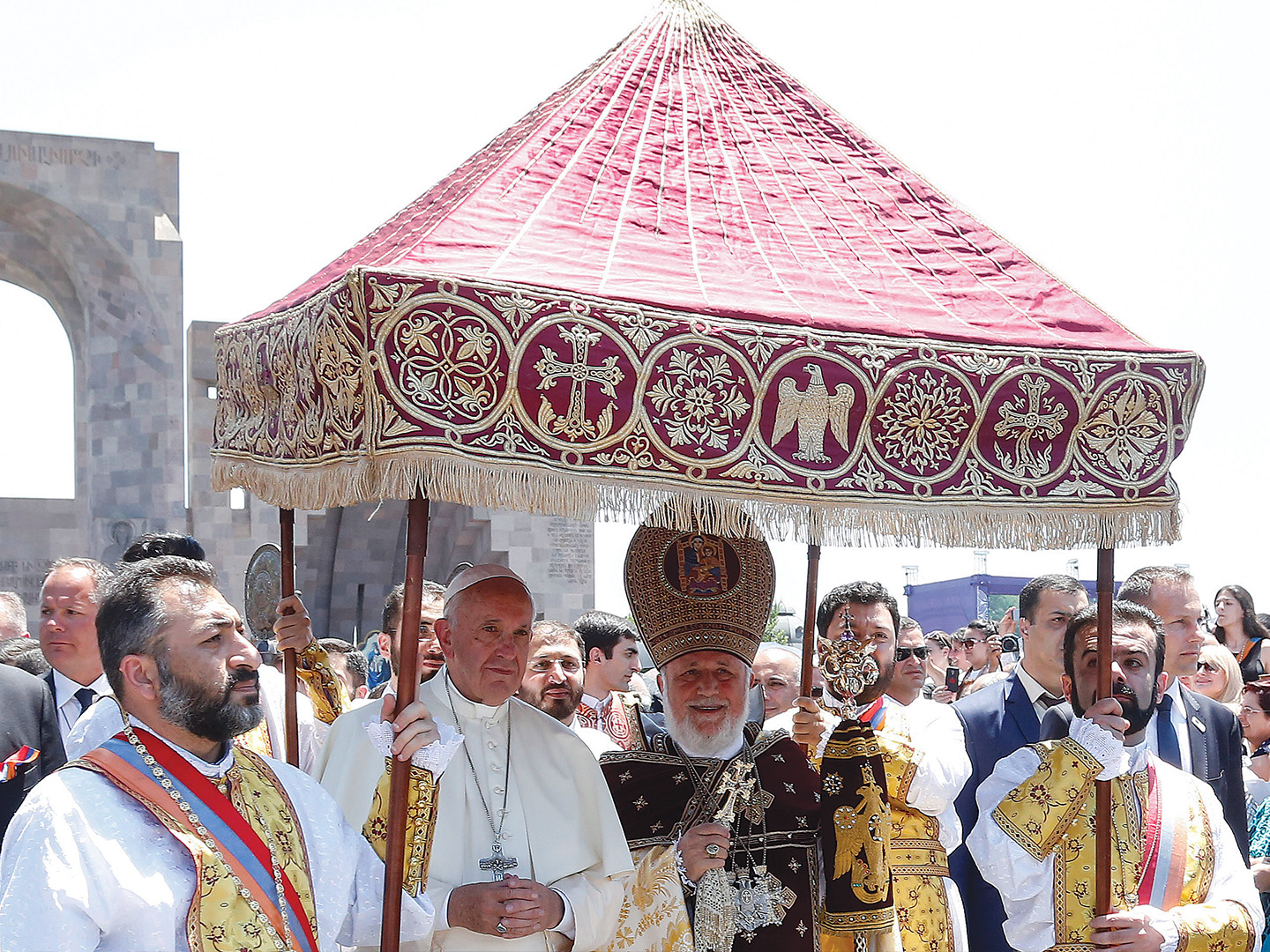
I pay homage to the Armenian people who, illuminated by the light of the Gospel, even at the most tragic moments of their history, have always found in the cross and resurrection of Christ the strength to rise again and take up their journey anew with dignity. This shows the depth of their Christian faith and its boundless treasures of consolation and hope. Having seen the pernicious effects to which hatred, prejudice and the untrammeled desire for dominion led in the last century, I express my lively hope that humanity will learn from those tragic experiences the need to act with responsibility and wisdom to avoid the danger of a return to such horrors. May all join in striving to ensure that whenever conflicts emerge between nations, dialogue, the enduring and authentic quest of peace, cooperation between states and the constant commitment of international organizations will always prevail, with the aim of creating a climate of trust favorable for the achievement of lasting agreements.
The Catholic Church wishes to cooperate actively with all those who have at heart the future of civilization and respect for the rights of the human person, so that spiritual values will prevail in our world and those who befoul their meaning and beauty will be exposed as such. In this regard, it is vitally important that all those who declare their faith in God join forces to isolate those who use religion to promote war, oppression and violent persecution, exploiting and manipulating the holy name of God.
Today Christians in particular, perhaps even more than at the time of the first martyrs, in some places experience discrimination and persecution for the mere fact of professing their faith. At the same time, all too many conflicts in various parts of the world remain unresolved, causing grief, destruction and forced migrations of entire peoples. It is essential that those responsible for the future of the nations undertake courageously and without delay initiatives aimed at ending these sufferings, making their primary goal the quest for peace, the defense and acceptance of victims of aggression and persecution, the promotion of justice and sustainable development. The Armenian people have experienced these situations firsthand; they have known suffering and pain; they have known persecution; they preserved not only the memory of past hurts, but also the spirit that has enabled them always to start over again. I encourage you not to fail to make your own precious contribution to the international community.
This year marks the twenty-fifth anniversary of Armenia’s independence. It is a joyful occasion, but also an opportunity, in cherishing the goals already achieved, to propose new ones for the future. The celebration of this happy anniversary will be all the more significant if it becomes for all Armenians, both at home and in the diaspora, a special moment for gathering and coordinating energies for the sake of promoting the country’s civil and social development of the country, one that is equitable and inclusive. This will involve constant concern for ensuring respect for the moral imperatives of equal justice for all and solidarity with the less fortunate (cf. John Paul II, Farewell Address from Armenia, 27 September 2001: Insegnamenti XXIX/2 [2001], 489). The history of your country runs parallel to its Christian identity preserved over the centuries. That identity, far from impeding a healthy secularity of the state, instead requires and nourishes it, favoring the full participation of all in the life of society, freedom of religion and respect for minorities. A spirit of unity between all Armenians and a growing commitment to find helpful means of overcoming tension with neighboring countries, will facilitate the realization of these important goals, and inaugurate for Armenia an age of true rebirth.
The Catholic Church is present in this country with limited human resources, yet readily offers her contribution to the development of society, particularly through her work with the poor and vulnerable in the areas of healthcare and education, but also in the specific area of charitable assistance. This is seen in the work carried out in the past twenty-five years by the Redemptoris Mater Hospital in Ashotzk, the educational institute in Yerevan, the initiatives of Caritas Armenia and the works managed by the various religious congregations.
May God bless and protect Armenia, a land illumined by the faith, the courage of the martyrs and that hope which proves stronger than any suffering.
Banner photo by Alessandro Bianchi /Reuters

